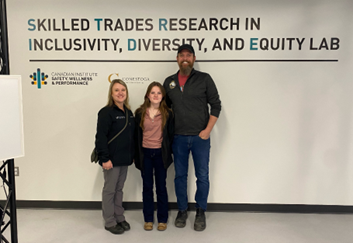Conestoga's Canadian Institute for Safety, Wellness & Performance (CISWP) answered the call to assist a local high school student interested in the welding program, but who couldn't find work boots to fit her tiny feet.

Conestoga's Canadian Institute for Safety, Wellness & Performance (CISWP) assisted a local high school student interested in the welding program, but who couldn't find work boots to fit her tiny feet.
The institute invited the teen, her mother and teacher for a tour of the Cambridge - Reuter Drive campus and CISWP's state-of-the-art labs, where researchers took the precise measurements needed for the student to be able to work with manufacturers to find properly fitted steel-toed shoes in size one and other personal-protective equipment that will keep her safe in the skilled trades sector.
The only college in Canada with an institute dedicated to applied research on work and health, Conestoga is uniquely positioned with the advanced technology and expertise to make significant contributions to building an inclusive and safe Canadian workforce.
CISWP recently received funding from the Natural Sciences and Engineering Research Council of Canada (NSERC) worth $360,000 over three years to study the impact of exoskeleton usage among the women skilled trades workforce and develop organizational resources to improve their design and adoption.
Encouraging more women to pursue careers, or even training, in the skilled trades is an admirable goal, but being unable to find the necessary safety gear that actually fits is often a hurdle to overcome because those are generally not produced for a diverse range of bodies.
Well-fitting equipment is essential for everybody training or working in the trades sector.
"In our pursuit of fostering greater diversity and inclusion in skilled trades, we have to remember that well-fitted PPE is not just a requirement, it's a necessity for every skilled trades worker," said Amin Yazdani, CISWP executive director. "PPE that fits well isn't just more comfortable - it's more effective."
The petite high school student is a "textbook example" of how individual needs are not being sufficiently addressed. Simply finding the required footwear should not be a barrier.
"The problem is how well are we equipping these individuals with the tools that address their needs, one being personal-protective equipment. For this individual, not having properly fitted safety boots would prevent her from even setting foot in any welding shop," Yazdani said.
In the quest to break down these barriers blocking many from entering the trades and being successful, CISWP will gather data to create a database that will support diversity and inclusion in the workplace by provide invaluable information to manufacturers.
"You need to be able to design the work environment, the tools that they use, the personal protective equipment to be inclusive of a diverse population," Yazdani said.
The institute's location within the Conestoga Skilled Trades Campus allows access to the next generation of workers and the faculty teaching them, providing an unprecedented opportunity to influence change early and more broadly.
The teenager's plight to find work boots was shared far and wide after the student's teacher reached out for guidance, unwilling to let something so basic stop her from pursuing the trades. A director at Skills Ontario and an advocate for women in the trades reached out to the national and international skilled trades community to find someone who could help.
The student's teacher also reached out to CISWP at Conestoga.
"I was proud that this request came in and we were able to do something meaningful. We didn't just provide a little bit of advice. We did something concrete and meaningful," said Nicki Islic, associate director of Strategic Initiatives and Stakeholder Engagement at the institute.
The Canadian Institute for Safety, Wellness & Performance is committed to building productive and sustainable workplaces through a collaborative and transdisciplinary approach. CISWP's goal is to position Canada as a global leader in empowering business to adapt and thrive in a competitive economy and aims to improve the safety, wellness and performance of the Canadian workforce through knowledge generation, research transfer, and workforce development. Working closely with stakeholders, the institute strives to conduct cutting-edge research and develop evidence-informed products, tools, and services to advance their capacity and address knowledge gaps.













